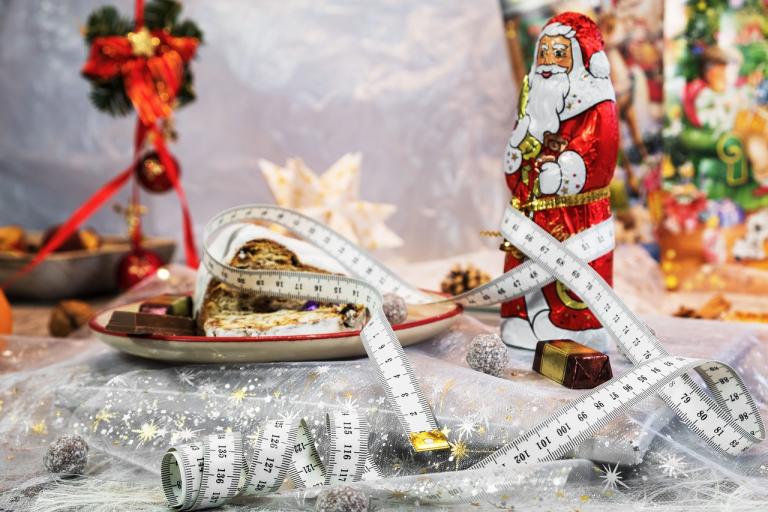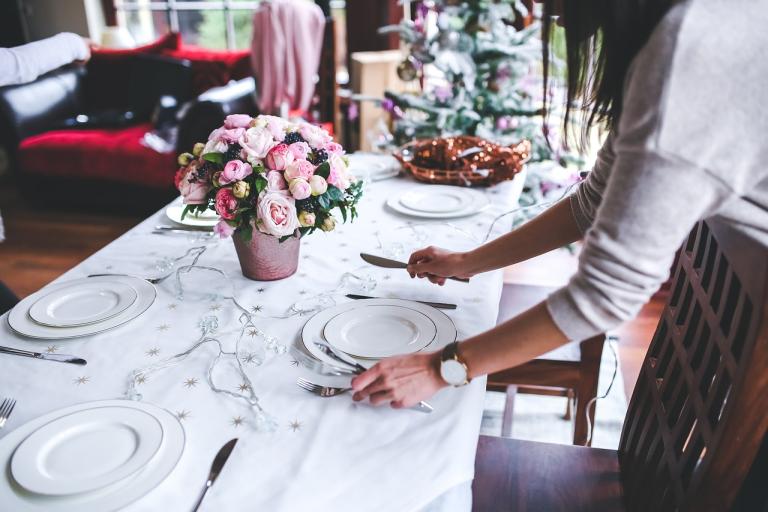Thanksgiving is primarily an eating holiday. The main activity is giving thanks around a feast of a meal. With all those desserts and side dishes, most of us overeat! And now Christmas is upon us, and we wonder, “How am I going to make it through the holiday season without gaining a few pounds?” Christmas is more than a one-time meal. It is a season of eating. Seeing food is a cue to eat it!! Even when you are not hungry. And we will see lots of extra and tempting foods this season.
Weight gain is a real concern, but the popular notion that most people gain between 5-10 pounds just isn’t true. Truth is that most of us will gain about a pound if we don’t track our eating and moderate our intake.
You might be thinking, “Well that is a relief,” but the problem is that we tend to keep that pound as a beginning weight gain throughout the new year. So, don’t go diving into the desserts with abandon just yet!
Here are 10 tips that can help avoid that extra holiday pound:
1) Pace yourself—you can’t give in to all the goodies that are available. I know it is tempting but press pause…take a bite, or a small piece and move on. Researchers tell us that the most enjoyable part of eating an item is in the first few bites. Enjoy those few bites and then push the dessert away.
2) Don’t engage in extremes—don’t go into deprivation mode thinking, “I can’t have that,” or you will want it more. Instead say, “I can have that, but I choose not to at this time.” Psychologically, that gives you control. Also, if you do overeat, don’t throw caution to the wind, and begin a binge. Just stop and regroup. “OK, I overate at that party, but I can cut back on the next meal.” Moderation is key this time of year.
3) Don’t skip meals to save up for the evening or party. You are more likely to binge eat when you do this. Going to an event when hungry, usually ends with overeating. Afterall, you deprived yourself all day. To prevent this, eat a light lunch, and drink a glass of water before you go to an eating event. Or have a small apple before the event to curb your appetite.
4) Find or bring a vegetable tray to an event. At food events, park yourself close to a low-cal party item. I know, how boring is this strategy? But if you nervously eat during the holiday-get togethers, you are likely to gain weight. So, find a low-calorie item at an event and munch away, e.g., carrots and hummus versus diving into the Christmas cookie tray. If you are asked to bring an item, bring a low calorie one to insure there are options for you to select.
5) Distract yourself by focusing on the people, not the food. Shifting your attention away from treats is a good strategy. Concentrate on the people at an event. Engage in interesting conversations and your brain will not be focused on all the food. And you just might meet someone interesting as well!
6) Drink more water instead of soda or high calorie drinks. Cut down on those peppermint mochas filled with sugar and fat. And watch the alcohol consumption. Force yourself to drink water on most occasions.
7) Stop eating after one serving. As tempting as it is, don’t gorge yourself. Restrained eating is something we all must learn given the abundance of foods and goodies this time of year. If you can take a bite or two and then stop, you cut the calories and enjoy the goodie! Also, say NO to second helpings. Eat slowly and give your brain and stomach time to communicate that you are full.
8) Avoid stress eating by doing non-food related activities. Stress easting is probably the biggest contributor to weight gain over the holidays. I wrote several books addressing stress and emotional eating. Thus, pay attention to your stress levels and determine to de-stress without using food, e.g., take a walk, relax with a book, etc. Recognize your stress, but ahead of time have a list of de-stressors that don’t include food or alcohol. Then, substitute eating for another activity.
9) Exercise if you eat a heavy meal. Research shows there is benefit to exercise two hours after you have indulged. So, if you overeat, hit the exercise bike, and get active. A 10-minute brisk walk provides huge benefit. In warmer climates, take a bike ride. In cold areas, go ice- skating or cross-country skiing. Take advantage of the outdoors for the Vitamin D you get from the sunshine as well.
10) Get good sleep. Fatigue makes you want to eat. When you don’t sleep, the hormone ghrelin rises. The rise in that hormone makes you hungry. Consequently, you will feel hungry even when you are not. Thus, lack of sleep sets you up to overeat. Seven to nine hours a night helps fight overeating. Both sleep and exercise work against overeating. It’s one of the best prescriptions for weight loss you will ever get. Get sleep, stop weight gain.
Finally, focus on the true meaning of the season, away from the commercialization. Celebration of Christmas should include eating, but it is not the star of the event. The birth of Christ is why we celebrate Christmas. So, when you sit down for a meal or notice the lavish spreads, thank God for His goodness and abundance. Remember His sacrifice to give up heaven and be “Emmanuel,” God with us. Enjoy the foods of the season but don’t lose sight of why we celebrate.



